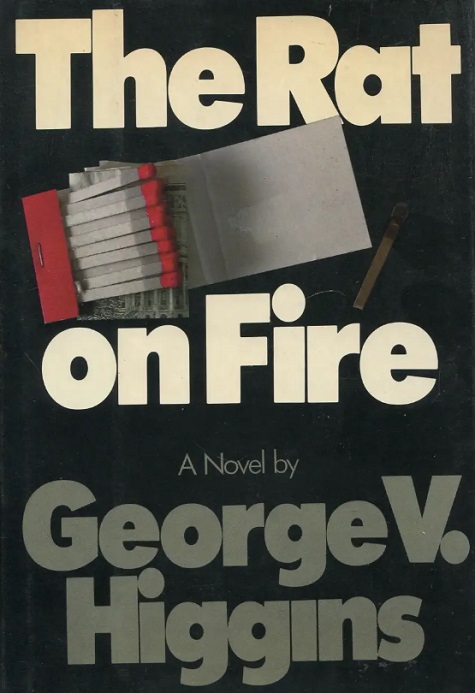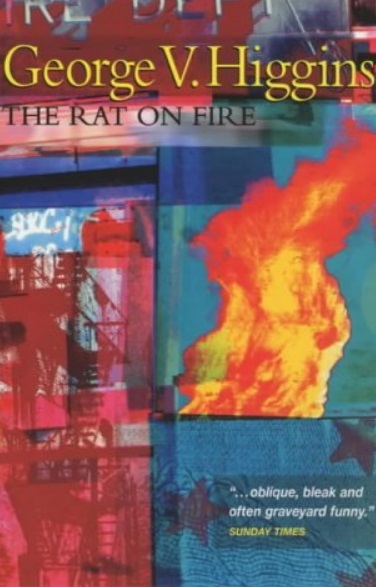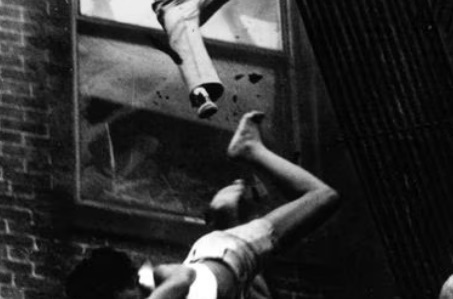The Rat on Fire opens with a man complaining about his job, setting the tone of a book full of people grousing about the shit they have to do and eat — hungry cops, lazy landlords, aggrieved tenants, garrulous bartenders, shady lawyers, and their savage secretaries. In her superb write-up of The Friends of Eddie Coyle, based on Rat author George V. Higgins’ groundbreaking debut novel, beloved Soluter ZoeZ describes that story’s grim depiction of doomed hustle, musing “maybe crime is always just capitalism on an accelerated course.” In his tale of an arson investigation, Higgins lays out something related but darker — work as a road to nowhere, a rat race that only has losers. But some people lose harder than others.
That first complainer is a state police lieutenant working for the Attorney General, and he is mad because he has to do his job. Which is to investigate people setting fires in Boston for insurance fraud and crooked fire marshals covering it up This would seem to be a pretty useful thing for law enforcement to do, but it’s only happening because of political pressure from a pencil-neck the lieutenant hates, and he spends much of the opening chapter hilariously elaborating on this hatred. But he ultimately dispatches two troopers to start working a case against a known slumlord and a likely bent marshal. They do this by going undercover as long-haul truckers who have an excuse to hang out at the diner where the conspirators meet. At the diner, for verisimilitude, they complain about their fake trucking jobs.
Like all of Higgins’ work, the story is told in conversations far more than actions — a crime is far more likely to be described than depicted, and even a description will be oblique if the describer is smart and careful. But the details come out eventually: slumlord Leo Proctor, who is probably the closest person to a main character here, needs the marshal to help him get away with burning down one of his apartment buildings. But before that happens, Proctor needs to torch another apartment building owned by Fein, the lawyer who’s representing him on a drunk driving charge, which is big trouble for a two-time loser like Proctor. And both buildings are currently occupied, by Black people. Proctor and his pals use the expected slur and use it a lot. They worry about the potential deaths, not because it would be bad on a moral level but because they would draw way too much attention to a covered-up arson. You can see the fix Proctor and Fein are in.
Both of them have lots to say about how hard it is to be a landlord with such terrible tenants, and I think Higgins walks a narrow line here. He doesn’t conceal or downplay his characters’ racism but he also doesn’t say they are inaccurate about some tenants trashing the place and stealing building materials. He introduces hardworking middle-aged Black woman Mavis Davis, a tenant in Fein’s building suffering from his shitty conditions (like the rats in the basement), and while she feels real, she also feels a bit like “one of the good ones.” An unambiguous victim to counter the other descriptions of Black people as lazy criminal deadbeats, and the need for a counter feels patronizing in its own right. Higgins largely writes about white people and this is a significant branching out, but if he missteps a bit, he also does good work with his Black characters’ dialogue, in that he doesn’t alter much (no dialect, thank God) from his general syntax and abbreviation and speech pattern — his characters don’t all talk alike, but they have similar ways of expressing themselves. And he lets a few other characters get more complicated, like the state senator Mavis goes to see about her awful building, and Mavis’ son Alfred, who is honestly a deadbeat and has a temper that leads him into very stupid fights. In a very Higgins touch, the state senator and several others are more annoyed about Alfred punching people when there are witnesses around than the assaults themselves — a line from Jackie Brown in The Friends of Eddie Coyle comes to mind: “This life’s hard, but it’s harder if you’re stupid!” Lashing out without thought, being stupid — this is not how to live.

But the people of The Rat on Fire live through complaining, through narrating their troubles and others in a way that, at least during the telling, gives them control. Here’s Proctor, describing the trooper who comes to the scene of his DWI crash:
“Here is this cop. I saw something once that was also alive and was just as big, but it was gray and it couldn’t talk and it had a very long nose and I saw it in the circus when I took the kids to the Garden and it cost me about seventy bucks and there was this guy that had on a silver suit and made a tiger jump on the back of this thing with a long nose and then the guy jumped on the tiger’s back and rode the two of them around the room and that big gray thing was an elephant. That’s how big this cop was.”
“The cop was as big as an elephant,” is eight words of dull cliché. This is 111 words that says the same thing, but with style — and not something condescending like “the language of the streets” or whatever. Proctor’s voice is his own, his delay of the obvious reveal is a calculated circling, a performance that calls attention to itself and is enjoyable as an extended rhythmic improvisation, a drum solo of a joke. The fact that Proctor himself is the punchline is not a problem, no more than it is to anyone telling a story where they play the fool — it’s still their story. Throughout the book, characters piss and moan to assert their existence.
Talking can also be an attack, a way of beating down or pushing back on another person. Proctor frequently does this to his hapless accomplice in arson (an extremely sarcastic extrapolation about animal behavior at the dump is a highlight). Proctor and Fein have a fairly contentious relationship: as a lawyer Fein is more interested in being a slumlord and music promoter than understanding the criminal law that Proctor needs in order to skate on that DWI. Fein tries to brush Proctor’s concerns in this regard off; Proctor is having none of that:
“This is the thing, all right? I happen to know the same thing as you know, which is that you know about as much about being in a courtroom like a lawyer as I know about maybe taking a trip to the moon, and you are about as interested in going into one of those rooms for me as I am in going to the moon for somebody else. Which I would probably be as good at going to the moon as you are going to be, going to court with me. Except, when you go to court with me, I am not going to the moon. I am going to jail.”
Here the simple statement is convoluted instead of elaborated. It twists on itself like a pretzel. The listener is forced to follow its logic (which does make sense), to submit — conversation as aggression. Proctor is not in control of a lot of things but he seizes control here and talks his mouthpiece into doing what he wants — paying for another, better lawyer to show up and talk circles around the prosecution.
Speech is not action, though, and the characters of The Rat on Fire will be the first to tell you that they are at the mercy of forces beyond their control. The words are loud enough to drown out the grinding of the gears for a time, but the gears grind on. Higgins is on surer ironic ground here — he gives his slumlords miles of rope to complain that their rent-seeking is actually a hardship for them. But the broader tone of exhaustion and trying to get by in a world that is only getting worse is not wrong, and in Mavis the voice of complaint is tuned in perfect pitch:
“Every time I made a little more, somebody who was selling things I had to have charged me a little more. I kept on doing better, but nothing got better. We were still right where we started, only I was working harder and harder to keep us there.
“That’s what’s the matter with Alfred. He looks around this place with the cracked linoleums on the floor and the busted screens and the plumbing that clogs up, and he looks out that window at all the junk. He knows about the rats and bugs, and he knows the air conditioner went to pay the taxes and fuel adjustment, and he gets mad… He’s frustrated, but the things that frustrate him are things that he can’t do anything about and I can’t either, so he picks out this guy and gets mad at him.”

Before he was a novelist, Higgins himself was a prosecutor in the state AG’s office, as well as the U.S. Attorney’s office investigating organized crime. It’s not hard to see sympathy in his portrayal of the troopers and their lieutenant, who are frustrated at the endless amount of sketchy talk they hear — Proctor is going to the dump to get rats? Why? — without getting enough for a solid criminal case, something that can’t be talked away by a skilled defense attorney (and Higgins was a defense lawyer too, with a clear enjoyment of that side of the game). They know an arson is planned and after Proctor sets off a damaging but easily-doused fire in order to scare people away from Fein’s building (relying on a racist willingness to blame an inexpert and clearly set fire on those bad old tenants — in particular, the wrathful Alfred), they know where it will go down. But they decide they need to catch Proctor in the act. “Good God, what chances we take with people’s lives,” the lieutenant says.
They do not catch Proctor in the act (the trooper watching his house doesn’t think of the back door). He goes to the basement and lights those junkyard rats on fire, sending them up the walls of the building — the idea is that this will mimic faulty wiring, enough for that bent marshal to call it an accident and get the insurance money. The people who have not already moved out will be at work during the day and no one will be hurt. But Alfred is still in the building — he’s recovering after getting beat up by the cops (in a fight that he very stupidly picked) — and he is trapped by the flames. He runs out to the fire escape, which promptly breaks and sends him falling three stories to his death.
This is almost certainly a reference to a fatal fire at an apartment building in 1975; the fire was not purposefully set in the manner of Rat’s arson, but the building owner was charged with setting trash fires in the back. During the blaze, 19-year-old Diana Bryant and two-year-old Tiare Jones fell five stories after the fire escape they had fled to collapsed. Bryant died, Jones survived in part because she landed on Bryant’s body. Boston Herald American photographer Stanley Forman had gone to the scene and his photo of Bryant and Jones in mid-air, the fire escape and some potted plants seemingly floating around them, ran in newspapers across the country. It’s credited with leading to a law in Boston requiring fire escape inspections, but of course, laws are not always followed. And they often are not even enforced, as a recent report showed.
The Rat on Fire ends with the lieutenant confronting Proctor, who knows he is up the creek and his only option is to roll over on the fire marshal and Fein. To talk. It closes the circle opened in the first chapter, where the lieutenant swears to get his man, but justice being done here doesn’t feel like a triumph. The lieutenant and his men feel bad that Alfred died and they’ll have to deal with the outcry, but they won’t face any real consequences because of that. They’ll feel the heat for a bit but can focus on squeezing Proctor and his associates and roll the shit downhill and the game will go on as it did before, minus one player — who, as his mother realized, never had a chance to really play anyways.
I don’t think Higgins set out to write condemnations of societal ills — he’s no Dickens — and he lived very well in the system that relentlessly wears down so many others. But I think because of that life, he was able to depict the system in a way a more antagonistic writer could not, that he could write his way into everything that leads up to a shock like Forman’s photograph. The language of his characters twists and turns, full of jokes and violence and asides and threats, accepting embarrassment and denying responsibility and casting blame until it’s too late and all that talk didn’t just fail to prevent a death, it caused one. And it’ll happen again. Because if talk is cheap, life is cheaper.

